Mastering Web Scraping with Tips and Practices

Data is everywhere, endlessly flowing across the internet. Every second, websites publish mountains of information ripe for the taking. Yet, tapping into this goldmine isn't just about grabbing what you want. It's about how you get it — and whether you're playing by the rules.
Welcome to web scraping in 2025. If you want to harness big data without landing in hot water, buckle up. This isn't theory. It's a practical, legal roadmap to collecting online data like a pro.
What Exactly Is Web Scraping
Put simply, web scraping is an automated way to pull data from websites. No manual copy-pasting needed. Instead, software and scripts do the heavy lifting for you, combing through pages while you kick back with your coffee.
Why Are Businesses Obsessed With Web Scraping
Because knowledge is power. And the right data drives smarter decisions — faster.
Here's how companies use it:
Competitive Intelligence: Track rivals' prices, promotions, and product launches in real-time. Stay two steps ahead.
Market Research & Trend Analysis: What's buzzing in your industry? Scraping social sentiment and news can reveal emerging demands.
Lead Generation: Build prospect lists by collecting publicly available emails and phone numbers.
SEO & Marketing: Discover winning keywords and analyze competitor strategies to boost your online presence.
Stock Market Insights: Monitor market signals and financial news to inform investment moves.
Hiring Trends: Recruitment firms keep tabs on job postings and industry demands.
Reputation Management: Track online reviews and social chatter to manage your brand's image.
Can Web Scraping Get You in Legal Trouble
Short answer is yes, but it depends on how you scrape and what you scrape.
Imagine you own a social media site. You want users to engage — not have bots sucking up your data or crashing your servers. That's why ethics matter.
Ask yourself:
Am I respecting the website's terms of service?
Could my scraping slow down or harm their platform?
Am I avoiding copyrighted, private, or paywalled content?
If the answer's no, you're on safer ground.
What's Allowed and What's Not
Web scraping itself isn't illegal. It's the method and content that can trip you up.
Legal scraping usually means:
Pulling data openly available to anyone online (no logins or paywalls).
Avoiding server overload — don't hammer a site with thousands of requests in seconds.
Respecting copyright and privacy laws — no grabbing personal or proprietary info without permission.
Illegal scraping often involves:
Bypassing login or paywalls.
Scraping private or copyrighted content without consent.
Ignoring anti-bot measures or IP bans.
Causing server crashes through excessive requests.
Real Legal Battles to Learn From
These cases are cautionary tales:
LinkedIn vs. HiQ Labs: HiQ scraped publicly available profiles. The court sided with HiQ, ruling public data scraping is generally legal.
Craigslist vs. 3Taps and Instamotor: Scraping and republishing Craigslist's listings without permission led to lawsuits and hefty settlements. This shows the dangers of republishing scraped content.
The takeaway? Scraping public data is one thing — copying and republishing proprietary data is another.
What About US Law
The US doesn't have a sweeping law banning web scraping. But several laws can apply depending on your actions:
Computer Fraud and Abuse Act (CFAA): No unauthorized access or bypassing protections.
Digital Millennium Copyright Act (DMCA): Protects copyrighted content.
Federal Trade Commission Act (FTCA): Stops unfair business practices.
Children's Online Privacy Protection Act (COPPA): Safeguards kids’ data.
Also, California's Consumer Privacy Act (CCPA) mandates transparency on data collection and allows consumers to opt-out.
Web Scraping Around the World
International laws vary wildly:
Europe: GDPR is strict. Scraping personal data without consent can mean massive fines — up to €20 million or 4% of revenue.
UK: Similar to GDPR, personal data scraping requires caution.
China: Heavy penalties for unauthorized data collection.
India: No specific scraping laws, but misuse can lead to prosecution under IT laws.
Bottom line? Always research local regulations before scraping internationally.
Commercial Use of Web Scraping
Planning to scrape for business? Ask:
What data am I scraping?
How am I scraping it?
How will I use this data?
If you're scraping public info with consent and for legitimate market research or competitive analysis, you're probably fine.
But ignore permissions, privacy rules, or scrape behind paywalls? That's when legal trouble starts.
How to Scrape Ethically and Legally
Read Terms of Service: Know what's allowed before you start.
Check for robots.txt: This file tells bots where they can't go. Follow it.
Ask for permission: When in doubt, reach out to the website owner.
Throttle your requests: Don't overload servers; pace your scraping.
Avoid personal data: Names, emails, financial info — steer clear unless you have consent.
Use APIs if available: They're legal, reliable, and reduce risk.
Identify yourself: Don't mask your scraper as a browser. Transparency counts.
Don't republish scraped data without permission: Use it internally for insights, not resale.
Concealing Your Scraper with Caution
Websites get smarter. They watch for bots through:
IP monitoring and blocking
CAPTCHAs
Honeypots (hidden traps for bots)
User-agent detection
While some use tricks to avoid detection, the legal and ethical route is to pace requests, rotate IPs responsibly, and prefer APIs.
The Bottom Line
Web scraping is powerful, but it's not a free-for-all. In 2025, the legal landscape is complex and changing rapidly. With AI increasing the value of data, regulators are paying closer attention than ever. To avoid lawsuits, fines, or worse, you need to be an ethical scraper who follows the laws, respects website owners, and keeps data clean. This is not just good practice but smart business.

















































